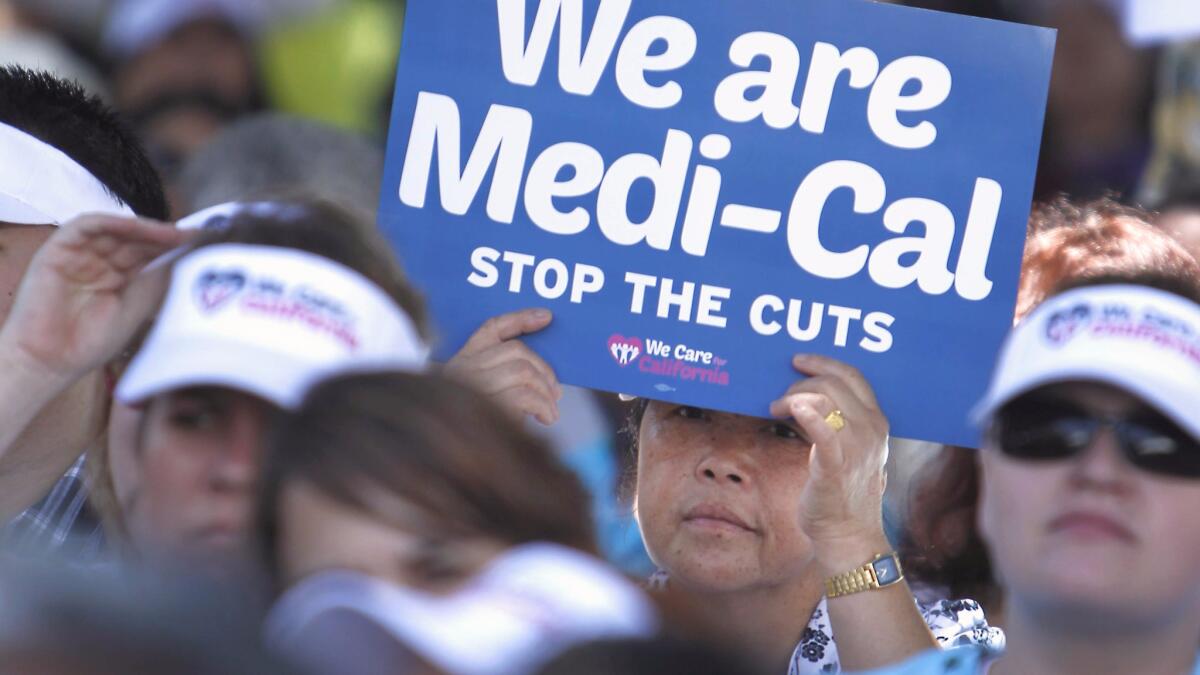Editorial: Yes on Proposition 52 to keep Medi-Cal funded

- Share via
About 1 of every 6 Californians lives in poverty, which helps explain why almost 12 million state residents are enrolled in Medi-Cal — the state’s version of Medicaid, the health insurance program for impoverished Americans that’s jointly funded by federal and state taxpayers. California’s enrollment is by far the largest in the country. Yet because the state is relatively wealthy, California has to pick up a larger share of its Medicaid costs than almost every other state does. The higher a state’s median income, the smaller the fraction of Medicaid costs that the federal government will pay.
For every dollar California taxpayers spend on Medi-Cal, the federal government puts up roughly $1. In Indiana, the federal contribution is about $2. In Mississippi, it’s almost $3.
So, faced with an enormous Medi-Cal bill and insufficient help from Washington, the state Legislature decided in 2009 to game the system. It imposed a tax on private hospitals, nominally to raise more money to pay for Medi-Cal. In fact, the money went right back to the hospitals in the form of higher reimbursements for Medi-Cal treatments — but along the way, it drew a roughly equal amount of dollars from the federal government, effectively doubling the revenue generated by the tax. By 2015, the tax was bringing in about $4 billion, plus $4 billion more from Washington.
The Legislature has been approving the tax on a temporary basis, and it is currently set to expire at the end of next year. Proposition 52, which is sponsored by the California Hospital Assn. and backed by a spectrum of healthcare-industry groups, would write the current law into the state Constitution, making the tax permanent (unless the Legislature kills it by a two-thirds vote) and preventing lawmakers from changing in any substantive way how the resulting funds are spent.
Why not leave this issue to the Legislature? The hospital association, whose members pay the tax, is rightly worried about two potential problems: that partisan squabbling might prevent lawmakers from renewing the levy in the future, and that the Legislature might siphon off more of the dollars for something other than Medi-Cal. The state has been diverting a portion of the revenue to the General Fund in a way that effectively lets lawmakers spend it however they wish, with the portion rising from 15% in 2009 to 24% in current law. Proposition 52 would cap the diversion at 24% in perpetuity.
That’s what critics call ballot-box budgeting — dictating through an initiative how the Legislature must spend tax dollars. It’s a risky practice because it leaves lawmakers with less flexibility to shift priorities and respond to budget crises. Yet Medi-Cal is just the sort of program that could use some constitutional protection. The state already beggars it, paying some of the lowest rates in the country for medical services. As a result, poor Californians have struggled to find doctors who’ll take Medi-Cal, so they’ve continued going to hospital emergency rooms — a costly and inefficient way to deliver healthcare. Proposition 52 wouldn’t improve that situation, but it would prevent it from getting worse.
The Service Employees International Union-United Healthcare Workers West, which opposes the ballot measure, offers a different complaint: Proposition 52 would guarantee that the Medi-Cal funds raised by the hospital tax are spent reimbursing hospitals, not attending to any of Medi-Cal’s many other needs.
The union is right that Medi-Cal should be putting more money into primary and preventive care, wellness programs and other efforts to keep enrollees out of the hospital in the first place. But hospitals remain a crucial source of many types of treatment needed by Medi-Cal patients, including outpatient services, specialists’ care and, yes, emergency room visits. Medi-Cal is already a potential money-loser for many hospitals; without the money provided by the tax, it could become even harder for Medi-Cal patients to find hospitals willing to treat them outside the emergency room.
Generally speaking, it’s better for voters not to tie lawmakers’ hands on the budget. But the tradeoff presented by Proposition 52 is, on balance, a fair one. It would preserve an important revenue source for a vital safety-net program that’s already woefully underfunded. It deserves a yes vote.
Follow the Opinion section on Twitter @latimesopinion and Facebook
More to Read
A cure for the common opinion
Get thought-provoking perspectives with our weekly newsletter.
You may occasionally receive promotional content from the Los Angeles Times.









